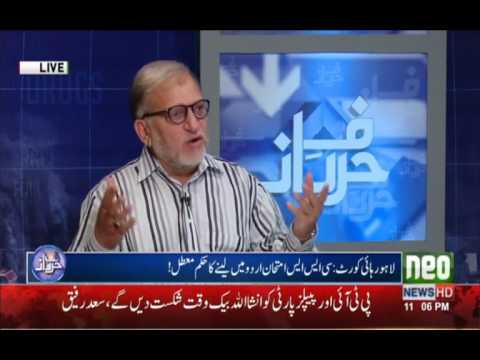The Lahore High Court has suspended last month’s decision of holding the Central Superior Services (CSS) examination for the year 2018 in Urdu. On Wednesday, a two member bench headed by Chief Justice Syed Mansoor Ali Shah passed its verdict, thus overruling the decision made by a single bench of the court, last month.
FPSC expressed concern that there is no syllabus to set the papers in Urdu nor are there any examiners who can perform the task.
Earlier in February, a single member bench of the LHC, headed by Justice Atir Mahmood, had directed the Federal Public Service Commission (FPSC) to conduct 2018 CSS examination in the Urdu language.
The petition was filed by Advocate Saif ur Rehman in which objections raised against FPSC’s advertisement. Saif ur Rehman claimed that the advertisement was unclear about the medium of examination, which, according to Supreme Court’s decision of the year 2015, should be Urdu.
However, FPSC maintained that the single member bench’s earlier decision was one-sided; it ignored the ground realities.
Read more: Farewell Central Superior Services! Good riddance!
FPSC had challenged LHC’s decision to hold the CSS examination in Urdu on the grounds that a majority of the subjects (43 out of 51) are in English and that Urdu is not taught as a compulsory subject at graduation level in the country. It is, therefore, not possible to define the new syllabus and switch the medium of examination from English to Urdu in a single year’s time.
The Federal Public Service Commission’s counsel informed the court that arrangements were being made to transfer syllabus from English to Urdu and a committee for the purpose had also been formed that would make recommendations in this regard in due course of time. He said the matter had also been taken up by the Higher Education Commission of Pakistan.
Chief Justice Syed Mansoor Ali Shah commented today at the hearing that ‘changing languages was not the court’s job’. Giving final remarks in the case, Justice Mansoor Ali Shah said the decision of the courts will still hold power, but that the decision made by the Supreme Court was intended to further enhance the acceptance and usage of Urdu language.
The earlier decision by the court, to hold 2018 CSS exam is Urdu, stirred confusion among many aspirants. Many of whom had either prepared for the exam in English or could only take in English due to their inability to take in Urdu.
Read more: Revitalising CSS Performance
The Supreme court decision to allow Urdu option is laudatory but the bigger issue facing Pakistan is the abysmal passing rates which indicate the poor quality of education generally in the country.
Last years CSS exam had a pass rate of only 2 percent from all those that took the exam. Out of 9,643 candidates who appeared in the competitive exam, only 202 candidates passed the written exam — this is the first step in a series of rigorous testing which includes medical and psychological exams and interviews.
Last years CSS exam had a pass rate of only 2 percent from all those that took the exam. Out of 9,643 candidates who appeared in the competitive exam, only 202 candidates passed the written exam.
Over the years increasing numbers appear for the exam. While, in 2006, 7,066 candidates applied for the exam and 4,125 candidates appeared for it; by 2016, 20,717 applied and 9,463 sat the exams.
The attempt to make the exam available to greater numbers of participants, through offering it in urdu, will certainly work in increasing the number of people which appear for the exam and thus more papers that the FPSC has to mark, but how will these individuals get through the rest of the interview system and beyond. Ultimately, they are expected to be productive members of the bureaucracy, the little productivity that we can expect from bureaucrats. The whole system works in English from reading, writing, courts, offices, notes files; how will these civil servants operate if they are not comfortable in English.
Furthermore, in today’s globalized world, access to information, knowledge, training, education is all in English, how will they operate in this era of multilateral, bilateral agreements on the different sectors of the country. In fact, to open all fields in Pakistan to all its citizens, we should be teaching English in all primary schools to give all children an access to first world’s facilities.














